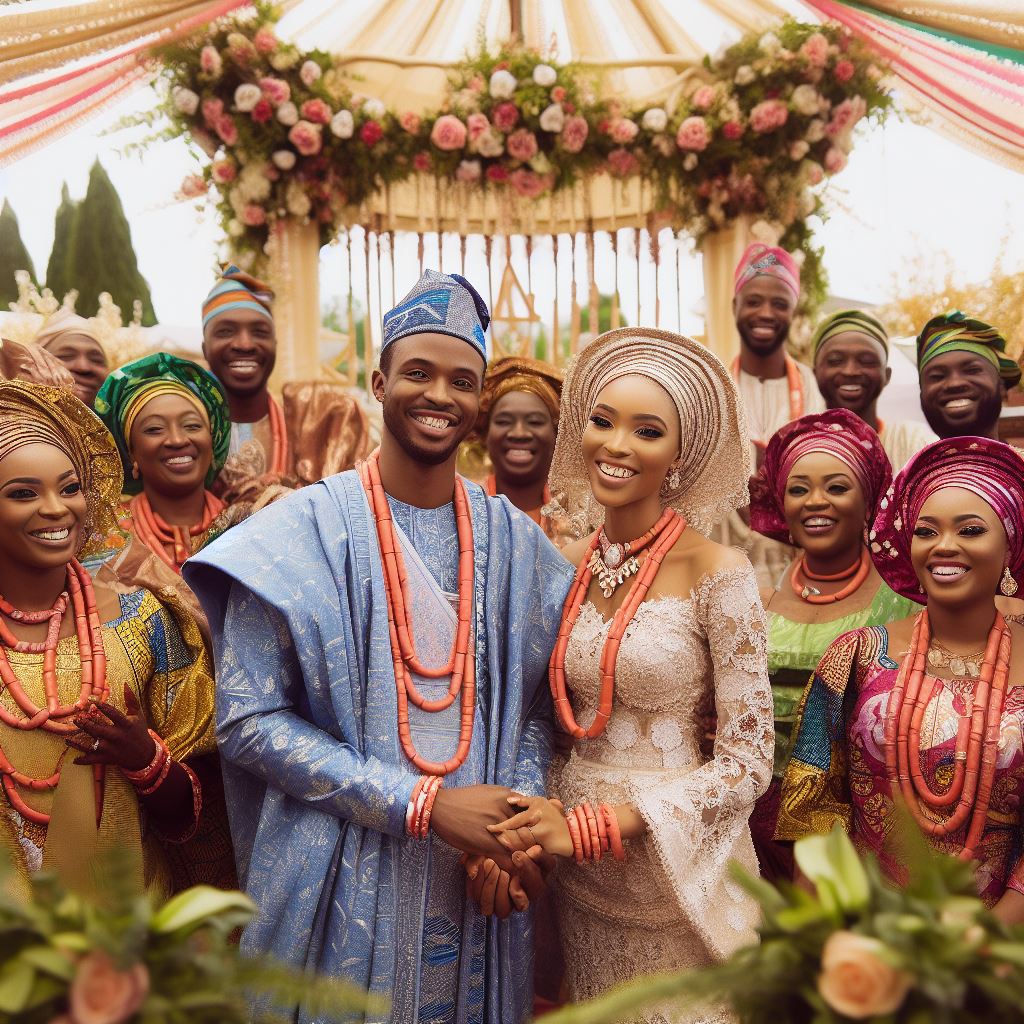Defining Love, Commitment, and Unity in Nigerian Marriages
Last Updated on October 17, 2023
Introduction
Defining love, commitment, and unity in Nigerian marriages is crucial for building successful and lasting relationships.
It is vital to have a clear understanding of these aspects in order to establish a strong foundation in marriages.
Love, commitment, and unity are the pillars that sustain a healthy and thriving marital relationship.
Importance of having a clear understanding of these aspects in order to build successful and lasting marriages
Without a proper understanding of these essential elements, marriages can deteriorate and lead to unhappiness and divorce.
Therefore, it is imperative to delve deeper into the meaning and significance of love, commitment, and unity in the context of Nigerian marriages.
Understanding these aspects will enable couples to navigate through challenges, maintain trust, and cultivate a lifelong partnership.
In this blog section, we will explore the essence of love, commitment, and unity and how they contribute to the success of Nigerian marriages.
Love encompasses not only romantic feelings but also selflessness, compassion, and genuine care for one another.
Commitment involves being dedicated and faithful to the relationship despite hardships or temptations.
Unity emphasizes the idea of two individuals coming together as one, sharing common goals, values, and visions for the future.
It is through the integration of love, commitment, and unity that Nigerian couples can build prosperous and fulfilling marriages.
By understanding the true nature of these elements, couples can foster intimacy, strengthen their bond, and achieve long-lasting happiness in their journey of marriage.
Defining Love in Nigerian Marriages
Cultural Perspectives on Love in Nigerian Marriages
- Nigerian marriages exhibit diverse cultural perspectives on the concept of love.
- In some Nigerian cultures, love is seen as a strong emotion that develops over time.
- Other cultures believe that love should be more practical and based on compatibility.
- Traditional values emphasize the importance of kinship and familial ties in love.
- Love in Nigerian marriages is often seen as a commitment between not just two individuals but also their families.
- Some cultures value the idea of sacrificing personal desires for the sake of love.
Traditional Values and Expectations Associated with Love in Nigerian Culture
- In Nigerian culture, love is often intertwined with concepts of respect and loyalty.
- Honoring and obeying one’s spouse is considered an essential aspect of love.
- Traditional expectations place an emphasis on gender roles within the marriage.
- Men are expected to be the providers while women are to be homemakers and caretakers.
- Love is expected to withstand challenges and endure throughout a lifetime.
- The extended family plays a significant role in marriage, influencing the couple’s love and commitment.
Modern Influences and Changes in Perceiving Love in Nigerian Marriages
- With globalization and exposure to Western influences, Nigerian marriages have seen a shift in perception of love.
- In urban areas, individuals seek romantic love based on emotional compatibility and personal happiness.
- Changing societal norms have led to more egalitarian relationships and shared responsibilities.
- Marriages based on love marriages are becoming more common, even in traditionally arranged settings.
- Increased education and awareness have made Nigerian couples prioritize emotional connections over societal obligations.
- Interfaith marriages are challenging traditional expectations and allowing for broader definitions of love.
Generally, love in Nigerian marriages is a complex and multifaceted concept.
Cultural perspectives, traditional values, and modern influences all contribute to defining love in Nigerian marriages.
Understanding these different perspectives can lead to a greater appreciation and acceptance of the diversity inherent in Nigerian culture.
Read: Promises for Couples: Inspirational Bible Verses
Understanding Commitment in Nigerian Marriages
In Nigerian marriages, commitment plays a significant role in ensuring the stability and success of the relationship.
It goes beyond mere devotion and encompasses various traditional concepts that are deeply rooted in the Nigerian culture.
The Significance of Commitment
- Commitment in Nigerian marriages is vital for creating a strong foundation based on trust and mutual respect.
- It provides a sense of security, stability, and emotional support for both partners.
- Commitment allows couples to navigate the challenges and obstacles they face throughout their lives together.
- Investing in commitment helps to maintain happiness and satisfaction in the marriage.
- It promotes the growth and development of the relationship, fostering a deep connection between partners.
Traditional Concepts of Commitment
- Loyalty is a core aspect of commitment in Nigerian marriages. It signifies faithfulness and steadfastness to one’s partner.
- Fidelity is highly valued, and infidelity is considered a grave betrayal of commitment.
- Respect and honor are fundamental in maintaining commitment, as they contribute to the emotional well-being of both partners.
- Supporting and caring for one another through all life’s ups and downs is an essential aspect of commitment.
- Embracing the traditional roles and responsibilities assigned to each spouse fosters commitment.
Challenges in Maintaining Commitment
Amidst societal changes and external influences, Nigerian couples encounter various challenges in maintaining commitment. These challenges include:
- Modernization and globalization can introduce new ideas and lifestyles that might clash with traditional commitment values.
- Increased economic pressures can strain marriages, testing the commitment of both partners.
- Technology and social media can tempt individuals outside the marriage, leading to potential breaches of commitment.
- Changing gender roles and expectations can sometimes create conflicts and affect the commitment between spouses.
- Western influence may alter the perception of commitment, causing confusion and different interpretations for Nigerian couples.
Addressing these challenges requires open communication, mutual understanding, and a willingness to adapt while preserving the core values of commitment in Nigerian marriages.
In general, commitment holds immense significance in Nigerian marriages.
It encompasses traditional concepts such as loyalty, fidelity, respect, and support.
Despite challenges posed by societal changes and external influences, Nigerian couples must prioritize commitment to maintain a strong and successful marriage.
Read: A Toast to Love: Local Drinks for Nigerian Anniversaries
The Role of Unity in Nigerian Marriages
Unity plays a vital role in Nigerian marriages, as it is the foundation that holds the relationship together.
Without unity, a marriage is likely to face numerous challenges and may even fall apart.
In this blog section we will emphasize the importance of unity in Nigerian marriages and discuss the traditional Nigerian values that promote unity in marriage.
Emphasizing the Importance of Unity
Unity is crucial in Nigerian marriages because it fosters a sense of togetherness and teamwork. When couples are united, they are better equipped to face the challenges that come their way.
Unity strengthens the bond between partners and allows them to work together towards shared goals.
Furthermore, unity in Nigerian marriages promotes stability and longevity. When couples are united, they are more likely to work through their differences and find common ground.
This leads to a stronger and more fulfilling relationship.
Traditional Nigerian Values that Promote Unity
Nigerian culture places a strong emphasis on unity within the context of marriage.
Several traditional values contribute to the promotion of unity in Nigerian marriages.
Firstly, teamwork is highly valued in Nigerian marriages. Couples are encouraged to work together as a unit, supporting and uplifting each other.
They share responsibilities and make joint decisions, ensuring that both partners have an equal stake in the relationship.
Shared responsibilities are another important aspect of unity in Nigerian marriages. From household chores to financial matters, Nigerian couples strive to share the burden of responsibilities.
This fosters a sense of equality and harmony in the relationship. Respect for elders is also a crucial value that promotes unity in Nigerian marriages.
In Nigerian culture, elders are seen as wise and knowledgeable.
When couples show respect towards their elders, they are more likely to seek their guidance and advice, which can help strengthen their relationship.
The Impact of Cultural Diversity and Individualism
Though Nigerian marriages highly value unity, they cannot ignore the impact of cultural diversity and individualism.
In recent years, Nigerian society has become more diverse, with individuals from different ethnic backgrounds coming together in marriage.
This cultural diversity can sometimes pose challenges to the unity of Nigerian couples.
Each partner may bring their own cultural traditions, values, and expectations into the relationship, which can lead to conflicts and misunderstandings.
It is crucial for couples to have open and honest communication, as well as a willingness to understand and appreciate each other’s cultural differences.
Individualism is another factor that can affect the unity of Nigerian marriages.
With the influence of Western cultures, the focus on personal goals and individual fulfillment has become more prevalent.
This shift in mindset may sometimes prioritize individual needs over the collective needs of the relationship.
Couples must strike a balance between pursuing their individual aspirations while still prioritizing the unity and well-being of their marriage.
In short, unity plays a vital role in Nigerian marriages.
It promotes togetherness, teamwork, and stability, which are essential for a fulfilling and long-lasting relationship.
Traditional Nigerian values such as teamwork, shared responsibilities, and respect for elders contribute to the promotion of unity.
However, one should consider and effectively manage the impact of cultural diversity and individualism to maintain unity in Nigerian marriages.
Read: Nollywood Movies: Perfect for an Anniversary Date Night

Balancing Cultural Expectations and Individual Choices
Cultural expectations often influence Nigerian marriages, occasionally creating tension with personal preferences in the process.
It is crucial to explore the dynamics between these two aspects and find strategies to maintain both cultural values and individual growth and satisfaction within the marriage.
Examine the Tension between Cultural Expectations and Personal Preferences in Nigerian Marriages
In Nigerian marriages, cultural expectations play a significant role in shaping the relationship dynamics and individual roles.
Traditionally, people view marriages as unions between two families, carrying significant societal and familial expectations.
However, personal preferences, desires, and aspirations of the individuals involved also have their place in modern Nigerian marriages.
Many couples are striving to strike a balance between upholding cultural values and customs while also respecting and fulfilling their own personal needs and aspirations.
This tension between cultural expectations and personal preferences can manifest in various aspects of the marriage, such as gender roles, decision-making, and even the choice of a life partner.
Couples need to navigate these differences to ensure a harmonious and fulfilling relationship.
The Need for Open Communication and Compromise to Navigate these Differences
Open and honest communication is essential in navigating the tension between cultural expectations and personal preferences in Nigerian marriages.
Both partners need to express their needs, opinions, and concerns openly, without fear of judgment or rejection.
Couples should engage in active listening and strive to understand each other’s cultural backgrounds, values, and beliefs.
This understanding can help foster empathy and create a safe space for compromise and finding common ground.
Compromise is a crucial element in balancing cultural expectations and personal preferences.
Both partners may need to make adjustments and sacrifices to create a marriage that respects and integrates both their individual needs and the cultural values that hold significance.
Strategies to Maintain Cultural Values while Fostering Individual Growth and Satisfaction within the Marriage
Maintaining cultural values does not mean suppressing individual growth and satisfaction within the marriage.
There are strategies couples can employ to strike a balance between the two:
- Education and Awareness: Both partners should educate themselves about their cultural heritage and understand its significance in their lives.
- Flexible Adaptation: Learning to adapt cultural practices and traditions to fit modern times can help foster individual growth and satisfaction while still honoring cultural values.
- Open-mindedness: Being open-minded and willing to explore and accept new perspectives and ideas can help bridge the gap between cultural expectations and personal preferences.
- Respect and Appreciation: Mutual respect for each other’s cultural backgrounds and values is crucial.
Appreciating and celebrating the richness of both cultures can create a positive and fulfilling environment. - Seeking Guidance: Couples can seek guidance from elders or professionals who specialize in multicultural marriages to navigate challenges and find suitable compromises.
In summary, Nigerian marriages face the challenge of balancing cultural expectations and personal preferences.
By fostering open communication, compromise, and implementing strategies to integrate both cultural values and individual growth, couples can create harmonious.
Read: Essential Tips for Strengthening Marriages in Nigeria
Building Successful and Lasting Marriages in Nigeria
In order to establish and maintain love, commitment, and unity in Nigerian marriages, there are several tips and advice that couples can follow:
- Mutual Respect: One of the key foundations for a successful marriage is mutual respect. Both partners should treat each other with dignity and show appreciation for one another’s contributions.
- Effective Communication: Communication is vital in any relationship. Nigerian couples should engage in open and honest conversations, actively listening to each other and expressing their thoughts and feelings.
- Continuous Effort: Marriage requires continuous effort from both partners. It involves actively working on the relationship, showing love and affection, and making compromises when necessary.
- Support from Others: During challenging times, it is essential for couples to seek support from family, friends, or professional counselors.
These individuals can provide guidance and offer a different perspective.
- Shared Goals and Values: Couples should establish shared goals and values that they can work towards together. This helps create a sense of unity and purpose in the marriage.
Conclusion
To sum it up, it is crucial to have a clear understanding of love, commitment, and unity in Nigerian marriages.
These factors are essential for a successful and fulfilling partnership.
Throughout this blog post, we explored the meaning of love, commitment, and unity in the context of Nigerian marriages.
We discussed how love goes beyond mere feelings, requiring effort and intentional action.
Commitment was highlighted as a vital element, involving loyalty, dedication, and perseverance.
Unity, on the other hand, emphasizes the importance of working together as a team and supporting each other’s growth.
Having a clear understanding of love, commitment, and unity fosters stronger relationships within Nigerian marriages.
It enhances communication, trust, and mutual respect.
Furthermore, it enables couples to overcome challenges and grow together.
Therefore, it is essential for readers to reflect on their own marriages and assess the presence and strength of these aspects.
Taking the time to evaluate the level of love, commitment, and unity in their relationships will provide valuable insights and identify areas that need improvement.
By actively working towards strengthening these aspects, couples can build successful and fulfilling partnerships.
In essence, Nigerian marriages thrive when love, commitment, and unity are at the forefront.
By prioritizing these elements, couples can build strong foundations that withstand the tests of time, leading to a lifetime of happiness together.


